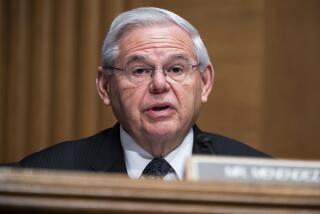India to Stick With Iran Despite U.S. Policy
- Share via
WASHINGTON — Despite unrelenting U.S. efforts to isolate Iran, India is determined to maintain a close political and commercial relationship with the Islamic republic, Indian Foreign Minister Pranab Mukherjee said here Monday.
“We are aware of the United States’ perception about Iran, but we do not consider that our good relationship with Iran should stand in the way of our good relationship with the U.S.,” Mukherjee said in an interview.
But it may become increasingly difficult for India and other countries to straddle the bitter U.S.-Iranian dispute. Support is growing in Congress for legislation to prohibit foreign companies that trade with Iran from doing business with the United States.
The legislation, sponsored by Sen. Alfonse M. D’Amato (R-N.Y.), would deliver a staggering blow to India’s economy. Although the United States is India’s largest single trading partner, cooperation with Iran is vital to New Delhi’s effort to penetrate the potentially lucrative markets in the Central Asian republics of the former Soviet Union.
“I hope it will not [pass],” Mukherjee said of the D’Amato bill, “because in that case it will have a punishing effect.”
Mukherjee said India’s relationship with Iran is based on commerce. He said India is funneling its trade with Central Asia through the Iranian port of Bandar Abbas, replacing a route through Moscow and Russian Black Sea ports, “which are not [as] available to us now” in the tumultuous post-Soviet era.
U.S.-Indian relations are far closer today than during the Cold War, when India followed a policy of nonalignment between the superpowers. Still, the world’s two most populous democracies have differences on topics other than Iran.
For instance, Mukherjee scoffed at the successful U.S.-led effort to extend indefinitely the 25-year-old Nuclear Non-Proliferation Treaty. He said the original pact, which India refused to sign, was flawed and making it permanent “has not improved on those inadequacies.” The treaty, signed by 178 nations, prohibits countries that did not possess nuclear weapons in 1970 from developing them.
Mukherjee, arguing that the accord discriminates against non-nuclear countries, said India would support elimination of nuclear weapons by all countries. India, which conducted a nuclear test explosion in 1974, Pakistan and Israel are thought to be the only nuclear-capable nations to remain outside the treaty.
In his meetings with U.S. officials, Mukherjee said he is urging the Clinton Administration to continue to refuse to deliver $1.2 billion worth of F-16 fighters and other military hardware that Pakistan has paid for but not received.
The sale was blocked by legislation banning military cooperation with Pakistan because of that country’s suspected nuclear weapons program. President Clinton told Pakistani Prime Minister Benazir Bhutto last month that he would ask Congress to soften that legislation.
If Pakistan gets the F-16s, Mukherjee said, its ability to threaten India will increase and “we shall also have to take steps to counteract that.” A renewed arms race in southern Asia, he said, would drain money from economic development in both countries.
More to Read
Sign up for Essential California
The most important California stories and recommendations in your inbox every morning.
You may occasionally receive promotional content from the Los Angeles Times.













